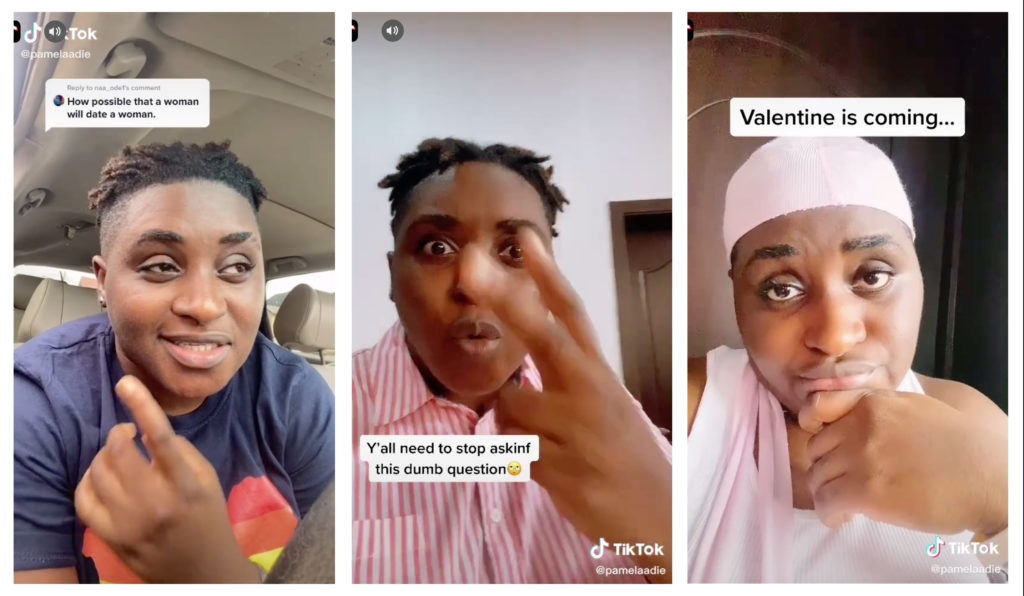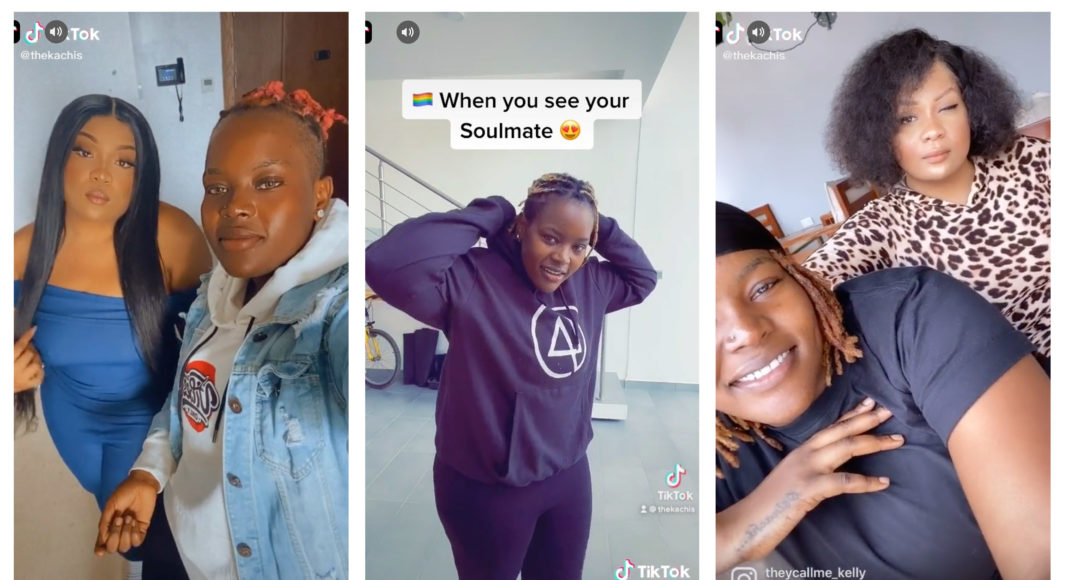By Mariam Sule
When Harry Itie created a TikTok account, he was looking to escape from the noise on other social media platforms. “I used to be very active on Twitter but I realized that I was constantly getting triggered whenever I was online. I like that on TikTok, my timeline is filled with videos of people dancing and being goofy,” the 31-year-old founder of the news platform The Rustin Times said.
With its accessible content and large platform, queer Nigerians are flocking to TikTok to carve out a space where they are free to express themselves in a way they are not offline.
TikTok markets itself as a place that “empowers everyone to be a creator,” and many queer Nigerians agree. In the heat of the lockdown in 2020, Dorathy ‘Trixx’ Etuh, a 26-year-old queer content creator living in Zaria, Nigeria, started creating videos with her TikTok account, even though she had made the account in 2018 but never used it.
“I started making queer content in April 2020 because I wanted queerness to be seen as normal by those around me. I have realized that when something is popular, it becomes normal to everyone. My videos aim to normalize what should have always been normal,” she said.
Alexandra Maduagwu, a 25-year-old creative entrepreneur and storyteller agrees. “TikTok is where I get to see more lesbian, trans and non-binary content than anywhere else. I love how much creativity goes into these videos,” they said.
“Telling stories in a fun way makes it easier for people to engage controversial topics. When people enjoy the content, it has the power to change their perspectives. I pick topics that concern the Nigerian queer community and present it in a way that makes my audience understand them better,” said Pamela Adie, 37, a TikTok content creator living in Lagos who founded The Equality Hub, an NGO that supports vulnerable and sexual minority populations. She believes the content “is a useful way for people to learn about the queer community in a non-confrontational way.”
Trixx says that she chose to put her content on TikTok because it was the first place she felt comfortable. “I prefer the way the algorithm works here. On Instagram and Twitter, the algorithm distributes your content to people around you who are familiar with it and that can mean low engagement. But TikTok shares your content with people who have shown that they enjoy that type of content. This makes me comfortable because I know the people I create content for resonate with it.” For a similar reason, Lesley Ijebome, a 22-years-old queer content creator living in Ilorin, said, “When I create content on TikTok, I am just trying to be myself.”
Nigeria passed a law that criminalizes queer Nigerians called the Same-Sex Marriage Prohibition Act (SSMPA) in 2014. The law not only criminalizes same-sex marriages and civil unions, but also prohibits public display of same-sex relationships, with prison sentences of up to 14 years. In TikTok videos, creators are vocal about their sexual orientation and display affection towards their partners. Some expressly state that they share a home.
Many young queer Nigerians have had to lie about their identities for employment opportunities, acceptance from family and family and sometimes even health care. A report done by The Initiative For Equal Rights shows that 60 percent of Nigerians will not accept a family member who is LGBTQ+. Hate and homophobia can also mean physical violence.
“The Same-Sex Marriage Prohibition Act of 2014 is an avenue to suppress our existence as queer people, and our content is a way of fighting back. The law plays a huge part in the way queer people are perceived within Nigeria,” said Bibi, 33, one half of “The Kachis,” a TikTok couple personality who created an account in January 2021 to represent other queer couples living in Nigeria. “When we create content, we intend to draw light to the lives of queer Nigerian couples living in Nigeria. It’s not something you see a lot of,” she added.
The Kachis also have a YouTube channel where they share longer videos of their daily experiences living and loving as queer Nigerian women. “While we endeavor to create content for each of our platforms, TikTok is quick. People want a story in 30 seconds and it allows for more creativity. Our videos are shared across Nigeria amongst queer folk within minutes,” she explained.
The Kachis’ content gets an outpouring of genuine support, but also receives negative, homophobic comments. “On one hand, our content attracts a lot of queer Nigerians, who are happy to find us. They post comments applauding us for what we do,” Bibi said, explaining that the positive interaction makes her feel seen and encourages her to create more. “We receive a lot of comments from Nigerians who claim that homosexuality is a western thing. Some Christians say we have gone astray. I try to focus on the love because it’s more than the hate.”
On TikTok, hate can mean name-calling, slurs, and other demeaning comments. “If a comment is harmful, degrading, or downright abusive, I can block the person from engaging with my posts. I do not want engagement at the cost of my mental health,” Adie said. On its website, TikTok promises to remove content that abuses or harasses community members and brings them psychological distress in its community guidelines.

“When I come across queer Nigerian content creators on TikTok, I am filled with pride. I follow as many of them as I can find. But I also worry for them,” said Azeenah Mohammed a 37-year-old human rights lawyer. The National Film And Video Censors Board made threats to jail the filmmakers of Ìfé, the first film made in Nigeria that centers a lesbian couple in a positive light, when the film was released.
“Though the National Broadcast Commission has claimed to, there is no evidence of their jurisdiction over online work,” Mohammed explained. They have tried many ways to curb and regulate it but the jury is still out on what they can do, apart from making public proclamations.” She said that queer content creators can say they were acting as a form of a plausible deniability.
The Nigerian queer community was involved in the #EndSARS protests in 2020 in part end some of these suppressive laws. During the physical marches and online uproar, queer folk echoed, “Queer Nigerian Lives Matter,” despite the opposition from non-queer people who claimed that it was not the right time to fight for queer liberation.
The government has taken many regulatory actions since the end of the protests, including the Bitcoin ban, Fx restrictions, and the suspension of SIM card activation across the country. Many Nigerians have discussed the possibility of a social media restriction or a total ban as one of the actions to expect from the government soon, and this speculation makes queer content creators fear for their safety. “While I try to create content without shame, sometimes I put in extra effort to tone down the expression to avoid my content being flagged,” Lesley said.
Trixx, whose content is made of mostly relatable jokes about what it takes to be a lesbian in Nigeria, explained, “I don’t think my content is that deep enough to interact with Same-Sex Marriage Prohibition Act.” She admits though it’s something she is still learning about, she faces backlash from non-state actors who also use TikTok, though that has been changing as of late. “These days, I get a lot of messages from strangers expressing joy that they found my content. Sometimes, they run into me in public and hug me. It’s amazing.”
A recent, intimate video she made with her friend went viral outside Nigeria. “My analytics showed me that 50 percent of engagement came from the United States. The reaction was positive. A lot of people were more concerned about why I didn’t kiss her than anything else,” she said.
Mohammed cast doubt on the government’s ability to censor queer content on TikTok. “I don’t think the Nigerian government can limit access to queer content or platforms because it means they will have to block access to many other services that people rely on. This will attract a backlash from Nigerians generally,” she asserted. “Instagram, Facebook and Twitter all have queer content created by Nigerians. Will they resort to blocking Nigerians from using all websites and social media?”
Despite the fears that surround their work and their visibility as queer content creators living in Nigeria, many look forward to earning from their craft like other content creators within Nigeria and beyond. Currently, Trixx earns money from making promo videos for brands looking to attract more leads, but she is yet to make money from creating queer content.
Bibi of “The Kachis” said that she hopes to be compensated for her content in the future, but in the meantime, “the positive interaction—the follows, the comments and the likes—are good enough rewards for us.” Trixx agreed, saying she considers her reward to be “making people feel comfortable in their skin.”


